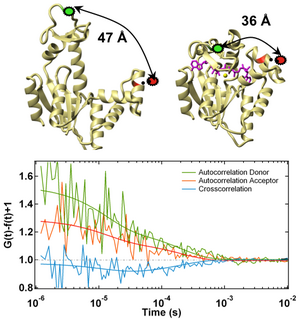Enzyme function
Enzymes are proteins which catalyze the metabolic processes in the cells. What is crucial in this context is their ability to regulate the rate of metabolic reactions in a physiologically meaningful range. An enzyme-catalyzed reaction usually proceeds in several steps: First, the starting materials or substrates of the reaction are bound to the enzyme, the enzyme-substrate complex is formed. This is followed by the actual reaction, and finally the products dissociate from the enzyme. In many cases, these three main steps involve changes in the enzyme's shape, termed conformation, analogous to a man made machine. Our goal is to observe individual enzymes at work, so to follow all steps directly, in order to learn more about the mechanisms and in particular the "mechanical" action of catalysis.
Christian Hübner

Gebäude 61
,
Raum 220
huebner(at)physik.uni-luebeck.de
+49 451 3101 4200


